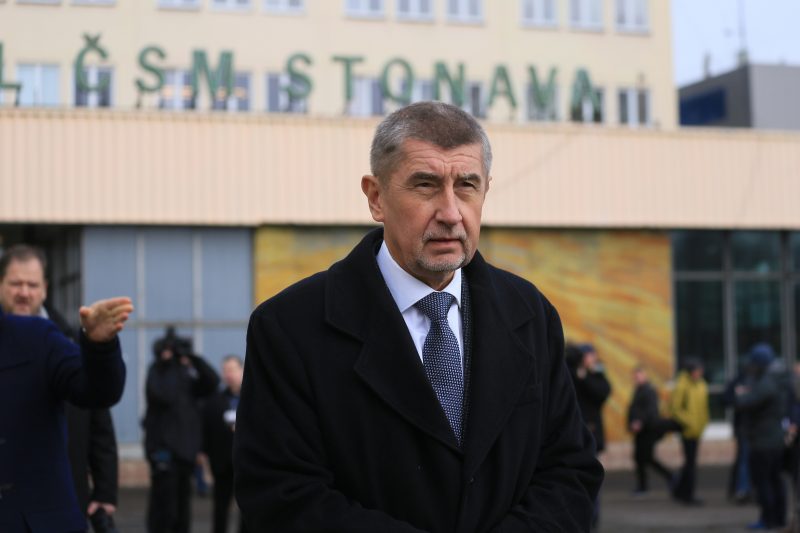Billionaire Czech PM tests EU’s new conflict of interest law
Czech Prime Minster Andrej Babis has flatly denied any involvement in Agrofert’s activities during his time as prime minister (Radek Mica)
Prague (AFP) – Facing conflict of interest proceedings under tightened EU rules, billionaire Czech Prime Minister Andrej Babis may soon become the first European politician found in violation of the bloc’s new law.
Babis, the second wealthiest Czech, is suspected of still owning the sprawling Agrofert chemicals, food and media group despite having formally transferred ownership to trust funds to comply with the law.
Separate proceedings sparked by the anti-corruption watchdog Transparency International and the opposition Pirate Party show that Babis has reason to worry.
“Agrofert gets EU subsidies, Czech subsidies, and takes part in public procurement,” David Ondracka, head of the Czech branch of Transparency International, told AFP.
“Babis is in a conflict of interest in all these segments and they all should be suspended.”
Last September, Transparency and the Pirates asked the European Commission whether Agrofert was entitled to receive billions in EU agricultural subsidies if Babis still controls it.
They also sent a complaint to the town hall in Cernosice, responsible for Babis’s place of residence near Prague, alleging that he violated a Czech conflict of interest law by owning media.
Both the European Commission and Cernosice have suggested that they are inclined to believe the allegations.
– ‘Political thing’ –
Babis has flatly denied any involvement in Agrofert’s activities during his time as prime minister, labelling the Pirates as “informers”.
“You have squealed on me in Brussels, you have squealed on me in Cernosice,” he said in parliament last week.
The Cernosice town hall said in January that it had made its decision but refused to make it public. Only Babis knows the details.
“I definitely disagree (with the decision). It’s become a political thing. I will definitely file an appeal,” Babis said in response.
“I can’t see how clerks who deal with traffic misdemeanour can take a decision on a complex legal problem like this. They’re wrong.”
In a leaked document, EU lawyers said Babis’s dual role as premier and tycoon “qualifies as a conflict of interest” since public officials should not decide on EU payouts for companies they ultimately control.
The Commission halted subsidies to Agrofert and sent auditors to check Babis’s business pending a final verdict expected by April.
It is also looking into subsidies Agrofert received from 2014 when the Slovak-born ex-Communist Babis became finance minister in the previous coalition government led by the Social Democrats.
Babis, whose meteoric rise in politics has been dogged by controversy since he founded the populist ANO movement in 2011, also faces criminal charges at home over alleged EU subsidy fraud from 2007 valued at some two million euros (dollars).
He has also been hit by allegations that he served as a secret police agent in the 1980s when the former Czechoslovakia was under Moscow’s rule.
– ‘First test’ –
Ondracka said Transparency had used information from beneficial ownership registers introduced across the EU last year as part of the bloc’s drive against money laundering.
A legal term, “beneficial owner” defines specific property rights in equity belonging to a person even though the legal title of the property belongs to someone else.
As the Czech register is not fully public, they used the Slovak one which yields 37 companies sheltered by Agrofert with Babis listed as the beneficial owner and 28 listing his wife Monika who also sits on the boards of both trust funds in charge of Agrofert.
In 2017, Agrofert received EU subsidies worth 2.1 billion koruna (82 million euros, $94 million), according to Czech media.
“Babis is in a unique position as a prime minister who is also a dominant recipient of EU subsidies,” Ondracka told AFP.
“One could say the EU is co-financing an oligarch who wins more and more elections in one member country,” he said, adding that Babis now had three options.
“Declare that Agrofert, which he still controls, won’t get any public money, sell Agrofert — but not to his wife — or quit politics,” he said.
The European Commission is expected to pass its verdict in April at the latest.
Independent political analyst Jiri Pehe said the outcome would be important for the EU as “this is the first big case after the directive tightening the conflict of interest rules took effect”.
“Babis is a first test for the Commission, so to speak. I think they will want to do a good job.”
Disclaimer: This story is published from a syndicated feed. Siliconeer does not assume any liability for the above story. Validity of the above story is for 7 Days from original date of publishing. Content copyright AFP.


